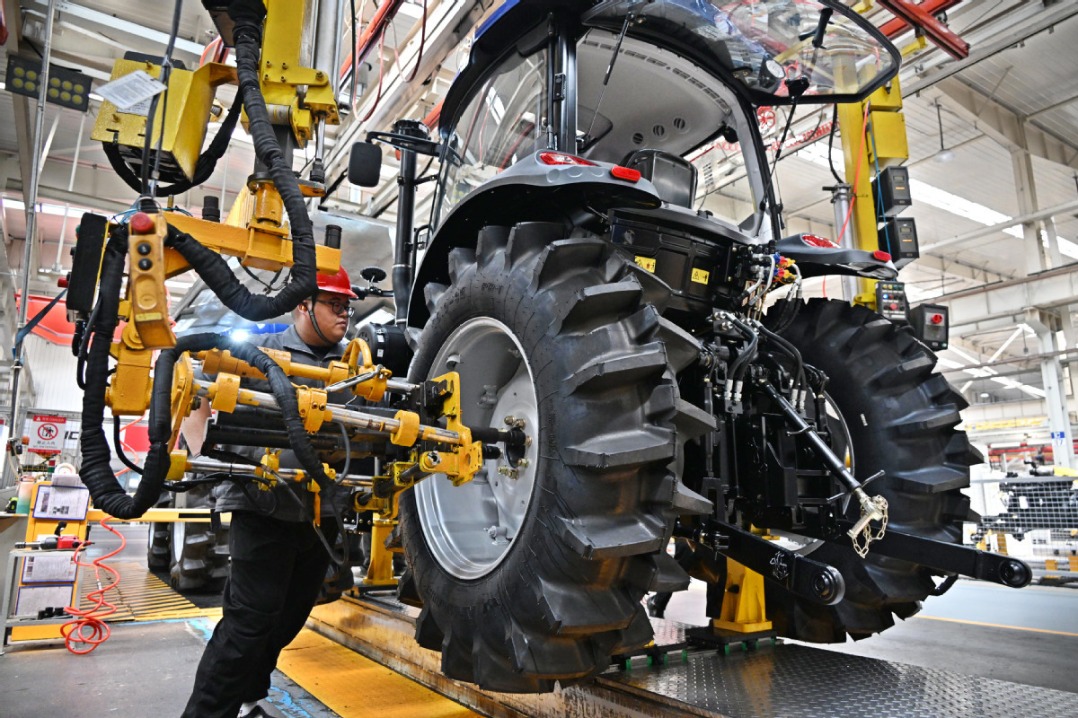Nation holds key to boosting global supply chains


Editor's note: A survey among China Daily's overseas readers ahead of the 20th National Congress of the Communist Party of China shows that the nation's ecological progress, economy, diplomacy, science and technology, and the Belt and Road Initiative are among some of the most closely observed issues. China Daily is publishing a series of special articles to offer readers an in-depth look at these topics.
China can attract multinationals and cope with any uncertainties, experts say
China's sprawling industrial economy will continue to play an important part in helping strengthen the resilience and stability of global industrial and supply chains — vital to ensuring the smooth running of the world economy, experts and corporate executives said.
Boasting a complete supply chain support system, a strong logistics system, a big market and favorable government policies that spur innovation, China holds appeal for multinationals and will maintain its key position in global industrial and supply chains, the experts added.
Highlighting headwinds such as external uncertainties, rising commodity prices and tight energy supply, the experts also called for deeper international cooperation to better safeguard the stability of global industrial chains.
Their comments come as China's manufacturing sector has made great strides in the past decade, with the nation's contribution to global manufacturing output reaching nearly 30 percent last year, up from 22.5 percent in 2012, according to data from the Ministry of Industry and Information Technology, or MIIT.
Deuk-kyu Hwang, president of Samsung Greater China, said, "With a complete supply chain supporting system, China is well positioned to cope with global uncertainties …and China boasts a strong logistics system that secures stable supply chains."
Hwang said the consumption upgrade of China's middle-income group, and technological innovation spurred by the government's new infrastructure initiatives in big data, artificial intelligence and 5G will generate new demand and broader development space in the nation's domestic market.
"In the future, Samsung will continue to prioritize development in China's large market," he added.
Wang Wei, head of the MIIT's planning department, said that despite short-term challenges and external uncertainties, China's industrial fundamentals remain intact.
The nation has a complete industrial system, with leading industry chain support systems, strong resilience and great potential, Wang said.
As the world's largest manufacturing country, China's manufacturing output value rose to 31.4 trillion yuan ($4.36 trillion) last year, up from 16.98 trillion yuan in 2012, data from the ministry show.
The nation ranks first globally in terms of output for more than 40 percent of the world's 500 major industrial products.
Craig Allen, president of the US-China Business Council, said,"China is an attractive location for supply chain integration."
Most United States companies investing in China are "in China, for China," and they hope to serve Chinese markets through highly global supply chains that involve imports and localized production, Allen said.
He added that China's scale motivates US companies, while the nation's ecosystem is strengthened greatly by investments in infrastructure and talent.
"We can work together to ensure strong, stable and resilient global industrial supply chains into the future," Allen said.
Added appeal
Liu Wenqiang, deputy head of the China Center for Information Industry Development, which is based in Beijing, said that as China strengthens its research and development prowess, it will continue moving up the industrial value chain, which will increase its appeal to high-end manufacturing and further help safeguard the stability of global industrial and supply chains.
Such a trend is already evident. The export value of China's technology-intensive mechanical and electrical products and high-tech goods rose to 12.8 trillion yuan and 6.3 trillion yuan respectively last year, up from 7.4 trillion yuan and 3.8 trillion yuan in 2012, according to the MIIT.
Chinese companies are also stepping up attempts to hone their research and development capabilities. More than 570 Chinese industrial companies have made it to the list of the global top 2,500 companies in terms of R&D investment, boosting their ability to support supply chains, according to the MIIT.
Moreover, in the first eight months of this year, actual use of foreign capital in China's high-tech manufacturing sector rose by more than 43 percent year-on-year, faster than the overall 16.4 percent growth rate for foreign capital use, according to the Ministry of Commerce.
China's contribution to global supply chains is also mirrored in the automobile industry. As the world's biggest auto market and production base for cars, the nation has an influence on the way in which global auto factories are run.
Jim Farley, CEO of US carmaker Ford, said that amid the electric vehicle transformation, a new era for the auto industry is reshaping global supply chains in a significant way, and China is playing a pivotal role in that transition.
Thomas Schmid, president of BMW (China) Service, said the complexity of the automotive supply chain is second to none in the world today, and international cooperation is not only necessary, but also key to reducing and eliminating uncertainties and solving problems.
His views were echoed by Wang Yiming, vice-chairman of the China Center for International Economic Exchanges, who said, "As global supply chains face disruption, commodity prices continue rising, and energy supply remains tight, international cooperation is more important now than ever."
Florence Verzelen, executive vice-president of Dassault Systemes, a French industrial software company that creates 3D models for numerous industries, said China has a massive consumer market and big manufacturing capacity, while Europe has high-end manufacturing and high-end digital industrial software.
"Strengthening economic and trade cooperation between China and Europe will not only help stabilize global trade, investment, and industrial and supply chains, as well as injecting more growth impetus into the world economy, but also help solve common problems faced by mankind, such as climate change and an aging society," Verzelen said.
Yang Yuanqing, chairman and CEO of Lenovo Group, the world's largest personal computer maker, said international cooperation remains one of the keys to ensuring the efficient and healthy development of supply chains worldwide.
"China is at a critical stage of moving from being a manufacturing powerhouse to a smart-manufacturing center, which will generate more opportunities," Yang said.
He added that Lenovo has more than 30 manufacturing bases globally, which provide products and services to 180 markets. The company also has established a stable cooperative relationship with 5,000 global suppliers. Such a sprawling supply chain network reflects the importance of international cooperation in manufacturing, Yang said.

Online Watch the video by scanning the code.




































